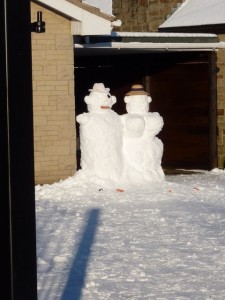Losing Friends When Falling In Love

There are couples who fall in love and become so preoccupied with each other that they put little time and energy into friendships they both had before the relationship. They get ‘frozen’ in a love relationship that has little or no room for anyone else.
You could say they get ‘frozen’ in an exclusive love relationship that ‘freezes out’ their old friends and as a consequence impoverishes their social life. This is a problem because friendships enrich a couple’s life together.
This is true of friends who are either single or coupled up. When this ‘freezing out’ of friendships occurs, the couple become hard to get a hold of, won’t return calls, or simply avoids attending places and events where established friendships would be encountered. This isolation eventually erodes friendship relationships to nothing. This is truly a loss for everyone involved.
I’ll start by mentioning the most common reason for this kind of couple and friendship freeze. The love relationship has unknowingly stimulated old childhood and/or adolescent needs for love that were really never met at the appropriate time for both individuals.
I say both because this kind of friendship freeze requires an intensity only a mutual effort can pull off. I’m talking about the freezing of friendships for both people in the relationship. The outcome can be a destructive form of social isolation for both persons in the couple.
The early needs for love that are brought to the surface are old and very influential in altering feelings and behavior. Being able to temporarily separate in a normal manner from one’s lover becomes more and more difficult to do as time goes on. What is frustrated and needful in both persons is now in command of their time and energy together.
The hope of satisfying these disappointed needs exclusively in the love relationship itself is demanding and blocks out any thing that does not fit in with that emotional agenda. The consequence is a frozen relationship and the freezing out of previously valued friendships.
Another related motivation may be to undo an earlier experience of abandonment. The emotional and largely unconscious reasoning would go something like this: someone who was supposed to love me left me, so now I have you, so I will dedicate myself exclusively to making sure you never leave me, and hopefully make up for the loss I’ve experienced earlier in my life.
When the avoidance of abandonment is the unconscious agenda, the emotions involved are very strong, strong enough to freeze the relationship into a mutual exclusivity that involves freezing other people out. The important point to remember is, the agenda to make up for the past is irrational and highly unlikely. The real way to fix this problem is to grieve the loss of childhood love and learn to give and receive the realistic love that is possible in adulthood.
Whenever lovers try to make up for previously disappointed love-life experiences, whether they occurred in childhood or later, this always creates trouble in their love relationship. Love is a living emotion that must be founded in the present. The present is where love as an emotional experience draws its life force. The past is memory and whatever gets re-created in a present love relationship from the past doesn’t belong there.
So instead of grieving the loss, a person can fear grief is too painful, and letting go too absolute. Trying to make up for the past in a present love relationship feels more hopeful no matter how impossible it might be. As I have said a number of times on this website, we only get one chronological childhood and adolescence. If something goes wrong during that period in our lives, we have to understand it’s impact on us, grieve the loss of what should have been, and move on to a satisfying life in the present.
The kind of friendship freeze I’m talking about in this post is often on a timeline. When a couple first gets together they may have had plenty of friends involved in their lives together. The freezing often begins as intimacy grows in their relationship. As if the couple made a decision to move away from other people fearing that other people will interfere with the growing intimacy between them.
This by the way can happen to family of origin relationships as well. What I’m saying is, family relationships can get frozen out as readily as any friendship relationship can. This is an indication of how strong the unresolved needs and feelings that emerge from past love-life disappointments can be.
Ring a bell? Tell me about it. Dr. Tom Jordan
